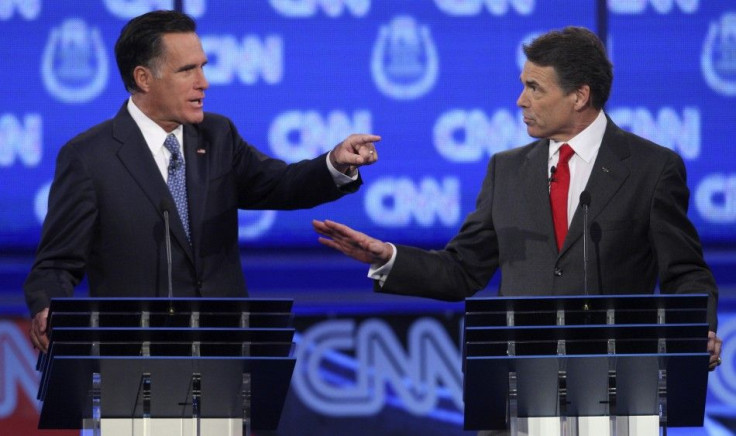GOP Debate October 18: Fact-Checking Top 5 Misfires

The candidates at Tuesday night's Republican presidential debate in Las Vegas weren't afraid to attack President Barack Obama, liberals and even each other in order to come out on top. However, whether it's due to the competitive spirit of the debate or something else, multiple candidates either stretched the facts or completely ignored them while attempting to one-up each other. The following is a tour of some of the facts tossed around by the candidates and why those statements are actually misfires.
1. Herman Cain, on his highly publicized 9-9-9 tax reform plan: It does not raise taxes on those making the least.
Several independent analyses have concluded otherwise. A report from the Tax Policy Center, a nonpartisan Washington-based think tank, concluded that Cain's plan -- which advocates implementing a flat 9 percent income, corporate and sales tax -- would increase taxes for 84 percent of U.S. households. The policy would hit low and middle-income households the hardest, according to the organization, which said the plan would result in a nearly 950 percent tax increase for households making between $10,000 and $20,000 per year. That would amount to a $2,700 tax increase for those households, according to the center.
Politifact reports that the disparity between 9-9-9 and the current tax code grows as a person's income shrinks. Although a single person earning about $40,000 would pay about $334 less in federal taxes under the plan, an individual making $30,000 would actually pay about $212 more.
2. Mitt Romney to Rick Perry: You were the chairman of Al Gore's campaign.
While the statement isn't completely false, it's certainly misleading. Although Perry still affiliated himself with the Democratic Party when former Vice President Al Gore unsuccessfully campaigned for the Democratic presidential nomination in 1988, several interviews and news articles confirm that he was one of 28 state legislators who endorsed Gore that year. Even though some claim Perry served as the Texas chairman of Gore's campaign, Tom Jurkovich, who was Gore's Texas director, told Politifact that Perry wasn't highly involved in the campaign and had zero operational responsibility. Moreover, Mike Knopp, who did press outreach for the Gore campaign that year, insisted the campaign didn't even have a chairman in the Lone Star State.
3. Michele Bachmann on Israel: The biggest problem with this administration and foreign policy is that President Obama is the first president since Israel declared her sovereignty [to] put daylight between the United States and Israel.
This is completely false. Although the U.S. has traditionally been a strong supporter of Israel, the two nations have had their disagreements in the past. While President Obama has criticized Israeli settlement construction on disputed lands, President Ronald Reagan famously issued a harsh critique of the country after its military attacked an Iraqi nuclear plant in the 1980s. His successor, President George H.W. Bush, had a serious dispute with Israel over settlement expansion and even suspended housing loan guarantees as a result.
4. Rick Santorum, on the Massachusetts health care plan passed during Romney's stint as governor: The right problem is health care costs. What you did with a top-down, government-run program was focus on the problem of health care access. You expanded the pool of insurance without controlling costs. You've blown a hole in the budget up there.
While health care spending has increased in Massachusetts as many lost their jobs during the Great Recession, a 2009 analysis by the fiscally conservative Massachusetts Taxpayers Foundation concluded that out of a state budget of $30 billion, the plan added just $88 million a year to state spending over the first four years of its implementation. The foundation concluded the added cost to state taxpayers in 2010 was $353 million, or just 1.2 percent of the state budget. However, Factcheck.org reports the state was already paying $707 million -- federal money covered half the cost -- to cover uncompensated care before the law was passed.
A June 2011 poll from the Harvard School of Public Health and The Boston Globe found that 63 percent of Massachusetts residents support the state's universal health care law, up 10 percentage points from 2009.
5. Santorum on the Troubled Asset Relief Program: [Perry] sent a letter the day of the vote on the floor of the House saying, pass the economic plan. There was only one plan, and that was the plan that was voted on the floor. It was TARP.
While Perry wrote the letter, the statement is still questionable. As chairman of the Republican Governors Association, Perry co-wrote a letter to Congress urging lawmakers to leave partisanship at the door and pass an economic recovery package, referring to the U.S. government financial bailout -- known as the Wall Street bailout, or TARP -- that was passed in 2008.
However, the day after sending the letter, Perry advocated just the opposite. He told The Dallas Morning News that in a free-market economy, government should not be in the business of using taxpayer dollars to bail out corporate America.
Perry insists the letter didn't explicitly advocate TARP, but instead called for the passage of some feasible economic recovery package. In a 2010 Texas GOP gubernatorial debate, Perry maintained that while he co-wrote the letter in question, he figured people were smart enough to understand what we were talking about, stop the spending and cut the taxes.
All in all, Politifact has rated Perry's claim that he didn't support TARP as half-true.
© Copyright IBTimes 2025. All rights reserved.





















